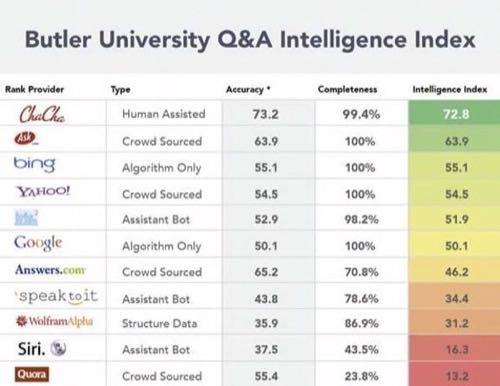
Savvy – and even not-so-savvy – mobile and online users know that most Question & Answer platforms aren’t worth the time and effort it takes to scan them.
But the good folks at the Butler University Business Accelerator set out to learn exactly how bad they are, and which ones suck the least.
The Butler University Q&A Intelligence Index aims to measure how accurately and quickly various mobile Q&A apps could provide quality answers to a variety of questions. The idea was to measure “the likelihood that a user could expect to receive a correct answer in a timely manner to any random query using natural language.”
The contenders included Ask.com, Answers.com, ChaCha Google, Quora, Siri and Yahoo Answers, among others. Questions covered advice (“What if a girl doesn’t want to talk to you?”), objective (“What are the 10 most common names?”), and subjective (“Who would win in a fight, The Hulk or Superman?”).
The winner – or, if you ask me, the least terrible – was ChaCha, while the ultimate loser was Quora. Apple’s Siri was second worst, while the oft-reviled Yahoo Answers came in a respectable fourth – which certainly makes me wonder about the strength of the competition.

Here are some highlights from the research:
ChaCha Rocks: “ChaCha delivered the highest-quality responses consistently across the largest group of categories and question types,” Trent Ritzenthaler, operating director of the Butler Business Accelerator, said in a statement.
Objective Questions: Ask.com did best on objective/temporal questions, such as “When does summer end?”
Tough Questions: Quora was best able to answer “difficult questions that require expert and extensive explanations,” but answered only 24% of all questions and consistently failed to answer at all – and often presented matches that did not include a viable answer.
What Is Siri For? Siri accurately answered only 37.5 percent of the questions posed, but Siri’s biggest strengths are considered to be in local discovery and operating system commands, which were not highly represented in Butler’s study of more mainstream questions.
100% Google: Google’s response rate was 100%, but the first organic result was correct only about half the time.

















